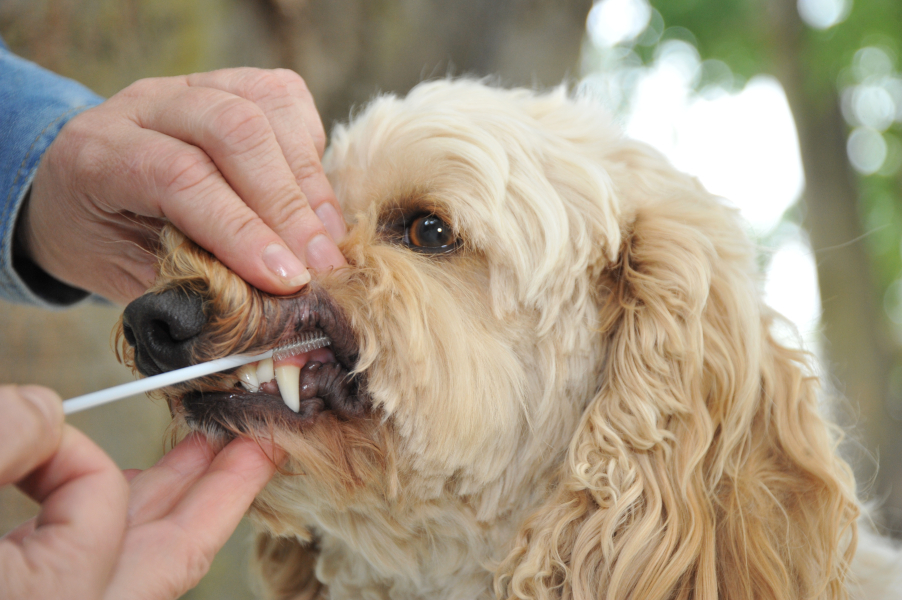Quick Summary
Click here for Price and Turnaround Time
Phenotype: Symptomatic onset of mucopolysaccharidosis VII occurs early and is progressive, with affected pups showing skeletal abnormalities, retarded development, excessively lax joints, and difficulty standing and walking.
Mode of Inheritance: Autosomal recessive
Alleles:N = Normal, MPS7bt = Mucopolysaccharidosis VII (Brazilian Terrier variant)
Breeds appropriate for testing: Brazilian Terrier
Explanation of Results:
- Dogs with N/N genotype will not have mucopolysaccharidosis VII and cannot transmit this variant to their offspring.
- Dogs with N/MPS7bt genotype will not have mucopolysaccharidosis VII, but are carriers. They will transmit this variant to 50% of their offspring. Matings between two carriers are predicted to produce 25% mucopolysaccharidosis VII-affected puppies.
- Dogs with MPS7bt/MPS7bt genotype will have mucopolysaccharidosis VII, a disabling, progressive condition.
Results of this test can be submitted to the OFA (Orthopedic Foundation for Animals)
Brazilian Terrier Health Panel
$105 per animal
Sample Collection
Dog DNA tests are carried out using cells brushed from your dog's cheeks and gums. The preferred cytology brushes are sent to you by mail, or you may provide your own brushes. For accepted alternative brushes, click here
We recommend waiting until puppies are at least three weeks old before testing.

Step-By-Step:
- Make sure the dog has not had anything to eat or drink for at least 1 hour prior to collecting sample.
- When swabbing puppies, isolate each puppy from the mother, littermates and any shared toys for 1 hour prior to swabbing. Puppies should not have nursed or eaten for 1 hour prior to collecting sample.
- If collecting samples from more than one dog, make sure to sample one dog at a time and wash your hands before swabbing another dog.
- Label brush sleeve with name or ID of dog to be sampled.
- Open brush sleeve by arrow and remove one brush by its handle.
- Place bristle head between the dog’s gums and cheek and press lightly on the outside of the cheek while rubbing or rotating the brush back and forth for 15 seconds.
- Wave the brush in the air for 20 seconds to air dry.
- Insert brush back into sleeve.
- Repeat steps 5 - 8 for each unused brush in sleeve on a fresh area of cheek and gums. Make sure to use and return all brushes sent by the VGL. In most cases, it will be 3 brushes per dog. If using interdental gum brushes, please note that the VGL requires 4 brushes per dog and only moderate or wide interdental gum brushes are accepted.
- Do not seal brushes in sleeve.
- Place all samples in an envelope and return to the address provided.
ATTENTION:
- Do not collect saliva/drool – the key to obtaining a good sample is getting cheek cells on the swab
- Do not rub swab on the dog’s tongue or teeth – this will result in poor quality sample
- Do not collect a sample from a puppy that has recently nursed – the mother’s genetic material can rub off on the puppy’s mouth and contaminate the sample
Mucopolysaccharidosis VII (MPS VII) is a lysosomal storage disease characterized by accumulation of glycosaminoglycans (amino sugars) within cells. Glycosaminoglycans are found in cells involved with development of bone, cartilage, tendons, corneas, skin and connective tissue, and in fluid that lubricates joints. Under normal conditions of cell metabolism, these amino sugars are broken down into simpler sugars by the beta-glucuronidase enzyme encoded by the gene β- glucuronidase (GUSB). Mutations in the GUSB gene disrupt production or activity of this enzyme leading to an accumulation of amino sugars that causes permanent cell damage.
MPS VII disease has an early onset and is progressive. By one month of age, affected pups typically show shortened broad faces, low-set ears, and broad chests relative to unaffected littermates. By two months of age, corneal clouding is observed and differential development is apparent with affected dogs being roughly half the size of unaffected siblings. As the disease progresses, standing becomes difficult and joints become swollen and are easily dislocated. Additional clinical signs include cardiac abnormalities, tracheal narrowing, and glycosaminoglycans in the urine.
Two independent, breed-specific mutations in the GUSB gene result in MPS VII disease: c.866C>T in Brazilian Terriers (reported as MPS7bt) and c.497G>A in German Shepherd Dogs (reported as MPS7gs). In both cases, the disease is inherited in an autosomal recessive fashion, which means that males and females are equally affected and that two copies of the defective gene are needed to cause MPSVII. Dogs with one normal and one affected gene (carriers) are normal and show no signs of the disease.
Genetic testing for MPS VII assists clinicians with diagnosis of MPS VII and helps breeders identify carriers among breeding stock to avoid producing affected dogs. Matings between carriers are expected to produce 25% of affected puppies.
